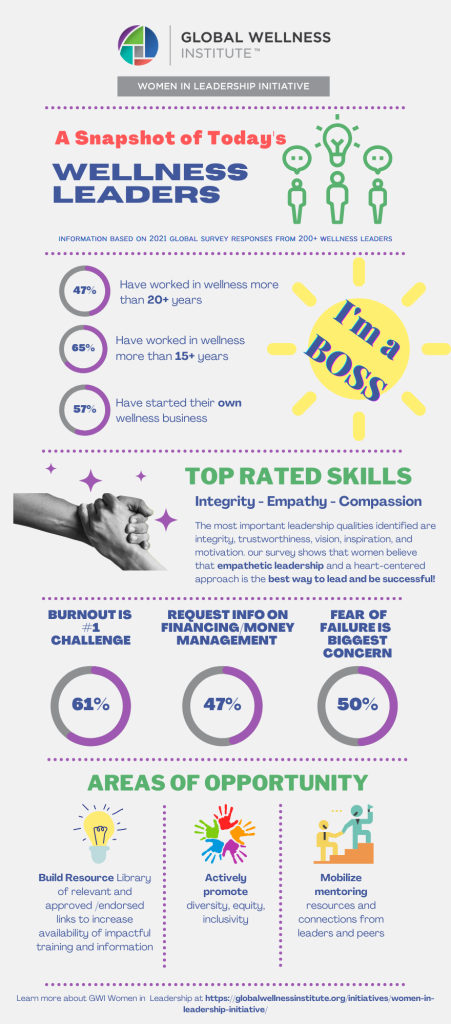Women in Leadership Initiative Trends
The Global Wellness Institute’s Women in Leadership Initiative will be releasing the complete results of their recent survey of women in wellness leadership roles this fall. Initial evaluation of the survey, combined with the expertise and insight of the members of the group, revealed the following trends:
TREND 1: Female Leaders Lead with Longevity
A whopping 52% of our respondents to the survey say they have been at their company between 15 and 29 years. This signals that women in leadership positions are loyal, dedicated, and willing to go the long haul to ensure success for their organization. It also points to wellness as a compelling industry for women looking for a long-term career.
TREND 2: Female Leaders Value Leadership with Heart
Female leaders are drawn to and inspired by heart-based leadership. Our survey revealed that the most important qualities for a leader are integrity, trustworthiness, vision, inspiration, and motivation. P+L prowess, arguably a skill that can be learned or outsourced, was given the least importance. As such, our survey shows that many women believe character traits are more important than hard skills and that empathetic leadership and a heart-centered approach is the best way to lead.
TREND 3: Lack of Support by Other Women Can Be a Challenge
Because there are fewer leadership positions for women in the US, there is fierce competition to snag those roles or hang on to them. Whereas men may size each other up and categorize themselves within the workplace, some women tear each other down personally to get ahead. One of the survey questions shows that “lack of support by other women” was one of their reasons for not advancing. We can and should do better in this space if we want a bigger voice.
TREND 4: Ageism is an Issue
Tangentially, one of the most common challenges noted on our survey was age discrimination. Many female wellness leaders say they have encountered age discrimination as they grow and evolve in their careers. Companies looking for established talent should look to older women with experience. Along with industry knowledge and life experience, as evidenced by our earlier trends, female leaders tend to be loyal, long-lasting employees, which is a valuable trait amid the hospitality industry’s current staffing shortage.
TREND 5: Women Wellness Leaders Embrace Healthy Stress Relief Strategies (For the Most Part)
Most of our survey recipients use healthy strategies for stress relief, with being outdoors, fitness, connecting with friends, eating healthy, sleep, breathing techniques, meditation, and spa-going topping the list. Though the numbers are relatively low, some women surveyed use cannabis and psychedelics to manage their stress, which aligns with the growing popularity of both in wellness and stress relief. However, many women surveyed (33%) manage stress with alcohol, which could point to a need for a discussion of the topic and solutions for managing alcohol consumption.
TREND 6: Women Leaders Desire and Need Financial Wellness Collaboration, Support, and Education
Most women surveyed do not discuss compensation with their peers, which can have an impact on a woman’s ability to achieve a fair salary. Encouraging women and companies to be more transparent about their salaries can help lead to more equitable pay and career opportunities. Additionally, financial wellness and financial education are both needed and wanted by female wellness leaders. For women who wanted to start a business but didn’t, funding/savings was the top reason. This again points to the importance of financial wellness practices to help support the personal and professional growth of female leaders.
TREND 7: Female Leaders are Seeking Mentorship
Mentorship is something that female leaders appear to be seeking—most of our respondents said they do not have a mentor, and of those women, most of them would like one. The category most women were seeking guidance was finance and money management, further highlighting the importance of financial wellness.

























































